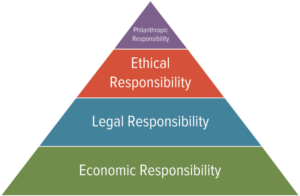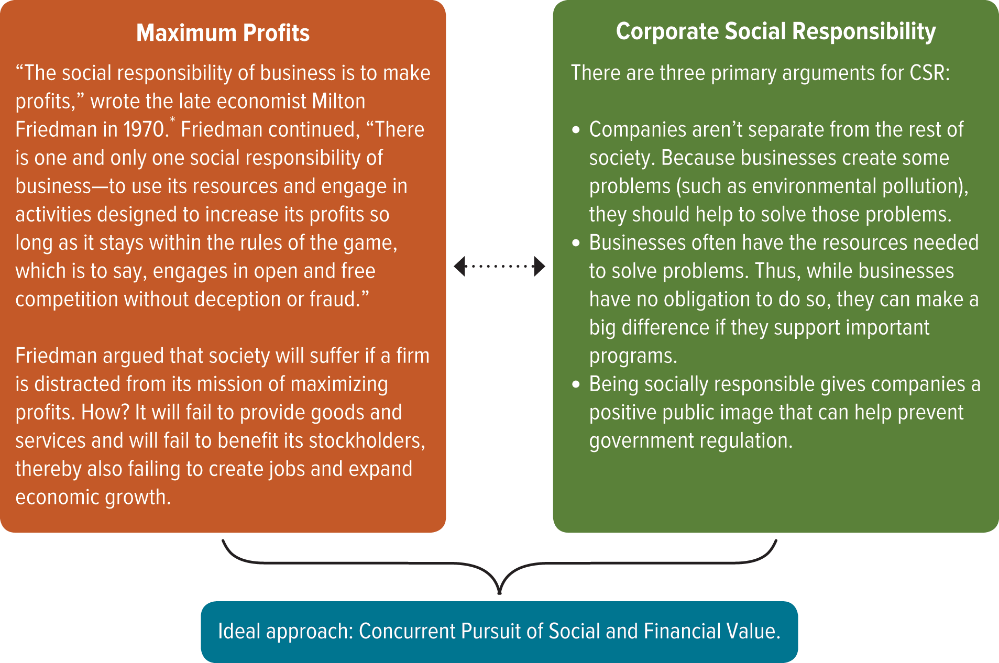This article talks about how to evaluate corporate social responsibility (CSR) along with its pros and cons.
A business is any activity that seeks to provide goods and services to others while operating at a profit, but some individuals believe the role of a business goes beyond just making a profit by fulfilling philanthropic responsibilities. The University of Georgia business-ethics scholar Archie B. Carroll provides a guide for thinking about the day-to-day practical and moral matters that businesses encounter. Carroll’s Global Corporate Social Responsibility Pyramid suggests that an organization’s obligations in the global economy are comprised of economic, legal, ethical, and philanthropic responsibilities that are present in a firm’s host country.

Figure: Carroll’s Global Corporate Social Responsibility Pyramid
Corporate Social Responsibility (CSR): Pros and Cons
If individual ethical responsibility is about being a good individual citizen, corporate social responsibility (CSR) is about being a good organizational citizen. CSR is a concern for taking actions that will benefit the interests of society as well as the organization. CSR may range from sponsorship of Little League teams to sending supplies to hurricane victims. At the end of the day, it is about contributing to society in positive ways that make a difference to the community. And as many companies have found, CSR and ethics go hand in hand: acting ethically and with a sense of social responsibility are often one and the same.
Some companies feel the goal for maximum profit-pulling them in one direction, while the desire to be socially responsible is pulling them in a different direction because money from the organization is used to fund these social causes instead of being returned to the business or the owners of the business. The figure below outlines the rationale of these opposing viewpoints. Blending these two viewpoints together into one creates a “concurrent pursuit of value—both social and financial.”

Evaluating Corporate Social Responsibility (CSR)
How can a company evaluate its social performance? A social audit is a systematic evaluation of a company’s performance in executing socially responsible programs, often based on preset goals.
Social audits often focus on six key areas, as explained below.
Corporate Policy: Positions on Political and Social Issues
The corporate policy describes a company’s stated positions on political and social issues. Many companies take positions on environmental matters. For example, Patagonia (a manufacturer of high-quality outdoor clothing and equipment) gives 1% of its profits to environmental preservation groups in addition to supporting dozens of other environmental programs.
Community Activities: Sponsorship, Fundraising, Donations, and Other Support
Many companies contribute to charities, sponsor sports teams, buy ads in school newspapers, donate to museums, permit employees to volunteer at charities, and support similar community activities.
Cause-Related Marketing: Supporting Worthy Causes
Cause-related marketing, or simply cause marketing, is a commercial activity in which a business forms a partnership with a charity or nonprofit to support a worthy cause, product, or service.
A good example of cause marketing is Box Tops for Education. General Mills began the program in 1996 with special box tops on certain cereals, including Total and Cheerios. Parents clip the box tops and send them to their local schools, which then trade the box tops for cash. The program has been so successful that it now includes many other brands, including Pillsbury, Ziploc, Kleenex, and Green Giant. By participating in the Box Tops program, American schools have earned more than $800 million to date.
Social Entrepreneurship: Leveraging Business for Social Change
Social entrepreneurship is described as an innovative, social value-creating activity that can occur within or across the for-profit and nonprofit sectors.
The focus is generally on creating value while doing good in the world.
Social entrepreneurship is also characterized by innovation, through finding an opportunity to create something new, rather than simply repeating existing business models or practices.
Sustainability: Green Is Good
Sustainability is economic development that meets the necessities of the present without compromising the ability of future generations to meet their own necessities. Companies large and small have launched green marketing campaigns promoting environmentally friendly causes, products, or stores.
Philanthropy: Not Dying Rich
“He who dies rich dies thus disgraced.” So said 1880s steel manufacturer Andrew Carnegie, after he turned from making money to philanthropy, making charitable donations to benefit humankind. Carnegie became well known as a supporter of free public libraries, among other good works.
Among the most famous and generous philanthropists in the United States today are Bill Gates (founder of Microsoft), Warren Buffett, and Mark Zuckerberg (founder of Facebook) and his wife, Priscilla Chan, who have pledged to give away 99% of their net worth (estimated at more than $45 billion) in the course of their lifetimes.